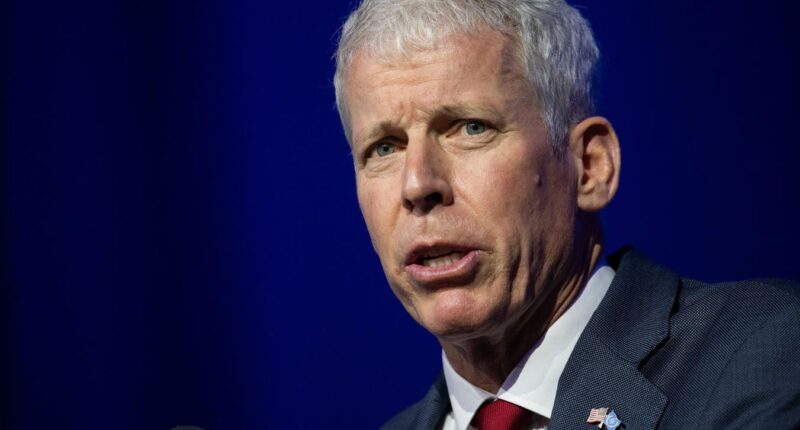Share this @internewscast.com
VIENNA, AUSTRIA – SEPTEMBER 15: USA’s Secretary of Energy Chris Wright speaks during the 69th annual International Atomic Energy Agency (IAEA) general conference on September 15, 2025 in Vienna, Austria. (Photo by Thomas Kronsteiner/Getty Images)
Getty Images
The energy policy lexicon has grown under the Trump administration. Expect to hear a lot of discussions about a “common sense energy and climate policy” going forward.
The term seems to have been embraced in particular by Energy Secretary Chris Wright.
In his September swing through Europe, which began with a gas conference in Milan, followed by discussions with various European leaders in Brussels, and concluded with an address to the International Atomic Energy Agency in Vienna, Wright talked about an American-European consensus on energy policy. Europe didn’t sign onto it.
Very Collegial And Pleasant
Several participants in the Brussels meetings spoke with me afterwards. One summed up this way, “It was all very collegial and pleasant. [Wright] said he was there to get a consensus on energy policy. But we have a consensus, a different one.”
Where the European consensus and the embryonic American one found common ground was on natural gas. On everything except natural gas, there was polite but emphatic pushback, I was told.
Wright disparaged wind and solar in his meetings, reflecting President Donald Trump’s aversion to them, but the Europeans voiced commitment to these renewables. The twain didn’t meet.
Energy — if Wright was sensitive to the nuances — has joined a list of things that aren’t as copacetic as they once were across the Atlantic.
On his European visit, though, Wright found agreement with his principal mission: to divert Europe from buying Russian gas to increased imports of U.S. liquified natural gas.
The Europeans aren’t opposed to more U.S. gas. They welcome it as a blow against Russia.
Fear of President Vladimir Putin’s Russia is widespread, as I found on two recent trips to Europe: one to speak at a meeting of the British Section of the Association of European Journalists in London, and the other to participate in the annual meeting of the Jean Monnet Association in Houjarray, France, which looks at the future of Europe. This fear is also fed by a general sense that America no longer has Europe’s back.
Some countries actually fear imminent Russian invasion.
Gas Talk Welcome
So whatever Wright had to say about gas fell on eager ears; although there is much suspicion of the United States, and the Trump administration’s endorsement of right-wing parties in Europe.
In Milan, according to a DOE press release, Wright, “highlighted President Trump’s commitment to growing gas exports and how U.S gas exports strengthen global stability, lower prices, and provide reliable alternatives to adversarial energy sources.”
However in Brussels, Wright was on somewhat less firm ground because of Trump’s attacks on the economic viability of wind and solar.
Although participants in the talks with Wright were anxious for me to understand how civil they had been, Wright did leave some ruffled feathers in his wake.
He excoriated the United Kingdom’s plans for a green transition and spared no opportunity to attack the Paris Accords, which he found “morally” wrong and “silly.”
Wright pushed back against offshore wind, which he said is uneconomic.
European politicians and energy aficionados alike treasure offshore wind and Europe’s global leadership in that sector. They also are firm supporters of the Paris Accords, signed in 2016, which limit CO2 emissions.
Last year, Europe generated 20 percent of its electricity from wind and about 10 percent from solar.
The U.S. Energy Information Administration says that onshore wind followed by solar is the cheapest new source of generation, but there are variables such as location, resource and weather. The EIA says this is true even without Biden-era subsidies, which are being phased out.
Some of the things Wright said in Europe raised eyebrows and, outside of studiously polite meetings, hackles. Here is one: “Climate change for impacting the quality of your life is not incredibly important.” He said people wouldn’t worry about it if it weren’t for media coverage.
Wright also said warmer, wetter conditions would be good for growing food.
He said stopping the flow of gas from Russian pipelines which bring it into Europe was the “hammer.” He said the United States could double its gas exports to Europe in five years.
The European Union plans to ban gas imports from Russia in 2027, although it is unclear whether all 27 nations in the EU can meet that deadline.
EU imports of gas from Russia have declined dramatically since the Russian invasion of Ukraine; they fell from roughly 45 percent in 2021 to about 19 percent in 2024 to 2025.
Last year, the United States supplied 45 percent of the EU’s LNG imports, and they are expected to be substantially higher this year.
It isn’t altogether certain that Europe wants to be too dependent on American gas. The head of a Brussels think tank asked me, “Why would we trade one dependence for another?”
Across Europe now, there is talk of the “Atlantic divorce.”
When it comes to energy, it isn’t so much a divorce as an accommodation: We will buy some of your gas, but not your ideas.









